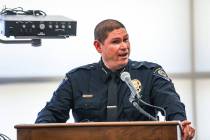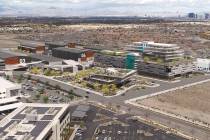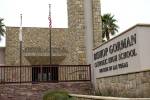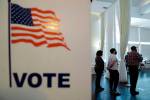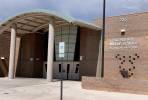Regents: Student fees rising 8 percent
Over the objections of students, the state's Board of Regents voted Friday to increase student fees by 8 percent next year.
"I'm just really disappointed and I guess confused," said Aimee Riley, chair of the Nevada Student Alliance.
She told the board that "students can't afford to share the sacrifice any more. This is just overburdening people who are the most vulnerable."
The group, an umbrella organization of student groups from all of the state's public campuses, took the formal position of opposing any student fee hikes until higher education leaders sought more input from students.
The board earlier had rejected a 5 percent hike and never seemed to seriously consider a proposed 13 percent hike.
College and university presidents said the extra money raised by the hike would stay on the campuses.
Nearly all of it would be used to improve student services, such as counseling and advising. Those services were severely cut over the past several years as state budget cuts took hold.
Students acknowledge that services are lacking. They say they would not necessarily be opposed to a fee hike, but this one caught them by surprise.
"Increasing the cost might make me take fewer classes," said Maya Scheuch, a College of Southern Nevada student who was hanging out Friday in the UNLV Student Union.
She and her friend, Ashley Masters, also a CSN student, said a fee hike would hurt them. But, they acknowledged that they are tired of waiting in long lines to get financial aid or other advice at the college.
The vote came after almost two hours of debate at the board meeting Friday. The hike follows a 13 percent increase that went into effect this year, which followed increases the year before and the year before that.
Student fees have more than doubled here in the past 10 years.
The same is true throughout the region. According to the Western Interstate Commission on Higher Education, average in-state tuition and fees have increased from about $2,800 in 14 Western states in the 2001-02 academic year to more than $7,100 this year. That is a 155 percent increase. They have increased 161 percent at UNLV in that same time, 231 percent at California State University, Fullerton, and 115 percent at Utah State University.
"How much more are we going to gouge students who are already struggling?" UNLV student Rachel Stephens asked the board before the vote.
The board directed the college and university presidents to meet with students over the next month to get their feedback on how they want the extra money to be spent.
At UNLV, a $5 per credit student fee that has been in effect will expire next year, which university President Neal Smatresk said makes the 8 percent increase effectively a 5 percent increase.
His plans estimate the increase will bring an additional $6.5 million to the campus. About $1 million will go to financial aid, while most of the rest would be used to hire advisers, counselors and faculty.
Much the same is planned at the rest of the states' campuses.
CSN's president, Michael Richards, said financial aid, advising and math are in serious need of funding.
None of regents said they thought an increase was a good idea, but it was better than not improving student services.
"I have no desire to raise tuition and fees. No desire whatsoever," Regent Michael Wixom said.
Of the 13 regents, only regents Ron Knecht, Kevin Page and Jack Schofield voted to delay making a decision until next month so students could have a say. Regent Mark Alden was absent and did not vote.
"To delay this decision keeps dragging it out," Regent Kevin Melcher said. "There isn't any right answer."
He added later, "I don't want to raise tuition. I think we need to."
Unlike the majority of issues before the regents lately, there was some vocal dissent.
Regent Schofield, who later apologized, said he felt like the board was throwing "dung" into students' faces.
FEES ON A STEEP CLIMB
Average in-state tuition at all public, four-year institutions in the West
■ 2001-02: $2,789
■ 2011-12: $7,125
■ Average increase: 155 percent
Tuition at selected
universities in the West
California State University, Fullerton
■ 2001-02: $1,849
■ 2011-12: $6,120
■ Increase: 231 percent
UNLV
■ 2001-02: $2,415
■ 2011-12: $6,304
■ Increase: 161 percent
New Mexico State University
■ 2001-02: $3,006
■ 2011-12: $5,827
■ Increase: 94 percent
University of Oregon
■ 2001-02: $4,071
■ 2011-12: $8,789
■ Increase: 116 percent
Utah State University
■ 2001-02: $2,590
■ 2011-12: $5,563
■ Increase: 115 percent










